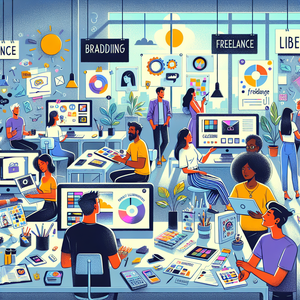
Navigating New Horizons: 15 Thriving Careers for Freelance Instructional Designers in 2024
The realm of education and training is undergoing a significant transformation, positioning freelance instructional design as an increasingly attractive and fulfilling career choice. The rise of online learning initiatives has created a robust demand for skilled professionals capable of developing engaging and effective educational content. Freelance instructional designers play a crucial role in crafting e-learning courses, training programs, and educational materials that cater to diverse audiences. This article explores 15 high-demand job roles within the instructional design sector for 2024, detailing the essential skills and requirements for success in each position. We’ll also address common challenges freelancers encounter and provide practical strategies to overcome them, empowering you to thrive in this evolving field.
Job Summaries:
Freelance Instructional Designer:
- Freelance instructional designers create compelling educational content that meets specific learning outcomes.
- They design online courses, develop training modules, and formulate assessments.
- Key competencies include proficiency in tools like Articulate Storyline or Adobe Captivate.
- A well-curated portfolio showcasing diverse projects is essential.
- Strong communication skills with clients are important.
- Managing timelines and finances is equally important.
- Current trends indicate a 25% growth in demand for freelance instructional designers in the coming years.
- Tip: Curate a diverse portfolio that demonstrates your flexibility across various subjects and audiences.
E-Learning Developer:
- E-learning developers craft interactive digital learning experiences.
- They collaborate with subject matter experts and instructional designers to enhance user engagement.
- Familiarity with learning management systems (LMS) is vital.
- E-learning can boost retention rates by up to 60% compared to traditional methods.
- Tip: Keep your skills updated with the latest multimedia tools to maintain a competitive edge.
Instructional Design Consultant:
- Instructional design consultants lend their expertise to organizations looking to refine their training programs.
- They assess existing materials, pinpoint gaps, and propose best practices.
- Strong analytical skills and a solid foundation in instructional principles are essential.
- Often necessitating a bachelor’s degree in instructional design or education.
- Tip: Build a robust professional network across various industries to open up consulting opportunities.
Learning Experience Designer:
- Learning experience designers focus on creating engaging and accessible learning environments.
- They leverage data and user feedback to inform course design, collaborating closely with educators and tech specialists.
- Proficiency in graphic design and user interface design software is crucial.
- Tip: Regularly incorporate learner feedback into your designs to enhance the overall learning experience.
Curriculum Developer:
- Curriculum developers design educational programs aligned with academic standards.
- Conducting needs assessments to cater to diverse learners.
- This role requires strong organizational and communication skills.
- Tip: Stay updated on educational trends to keep your curriculum relevant and engaging.
Instructional Coordinator:
- Instructional coordinators oversee the development and implementation of educational programs.
- They analyze methodologies and assess curriculum effectiveness.
- A master’s degree in instructional design or educational administration is often a prerequisite.
- Engage in continuous professional development to enhance your leadership capabilities.
Assessment Specialist:
- Assessment specialists design evaluation tools to gauge learner progress and program efficacy.
- A thorough understanding of assessment theories is essential.
- Tip: Familiarize yourself with various assessment methodologies to bolster your effectiveness in this role.
Training and Development Manager:
- Training and development managers supervise organizational training programs.
- Ensuring employees receive effective learning experiences.
- A bachelor’s degree in human resources or education is typically required.
- Experience in instructional design is necessary.
- Tip: Foster a culture of continuous learning by integrating feedback into training programs.
Content Developer:
- Content developers produce educational materials across various platforms, ensuring accuracy and engagement.
- Essential skills include strong writing capabilities and creativity, along with proficiency in content development tools.
- Tip: Experiment with diverse formats and platforms to effectively reach varied audiences.
Graphic Designer for E-Learning:
- Graphic designers for e-learning create visual elements that enhance the educational experience, including infographics and animations.
- A strong portfolio and proficiency in graphic design software are crucial.
- Tip: Stay attuned to design trends to ensure your work resonates with contemporary audiences.
Corporate Trainer:
- Corporate trainers design and deliver tailored training programs.
- Assessing skills gaps and facilitating learning sessions.
- Strong communication and presentation skills are essential.
- Tip: Utilize storytelling techniques to make your training sessions more relatable and memorable.
Mobile Learning Specialist:
- Mobile learning specialists focus on creating educational content optimized for mobile devices.
- Proficiency in mobile app development and user interface design is essential.
- Tip: Create bite-sized learning modules that cater to the needs of on-the-go learners.
Web-Based Training Developer:
- Web-based training developers create engaging online training programs.
- Often requiring a background in instructional design or web development.
- Tip: Ensure your courses are accessible across multiple devices to maximize reach and engagement.
Performance Improvement Consultant:
- Performance improvement consultants analyze organizational performance and propose strategies to enhance learning initiatives.
- A robust background in instructional design and data analysis is essential.
- Tip: Leverage data-driven insights to support your recommendations and demonstrate their effectiveness.
Learning Management System (LMS) Administrator:
- LMS administrators manage and maintain learning management systems.
- Providing technical support and analyzing user data.
- A background in instructional design or IT is often required.
- Tip: Regularly assess user engagement data to enhance the learning experience continually.
Freelance instructional design offers a wealth of career opportunities, each presenting unique challenges and rewards. As the demand for skilled instructional designers continues to climb, staying informed about industry trends, honing in-demand skills, and actively networking will significantly bolster your prospects. By exploring the diverse roles highlighted in this article, aspiring freelance instructional designers can identify paths that align with their interests and strengths, ultimately making meaningful contributions to the ever-evolving field of education and training. To further enhance your expertise and marketability, consider pursuing industry certifications or online courses that can provide additional insights and skills.
Explore More Jobs

